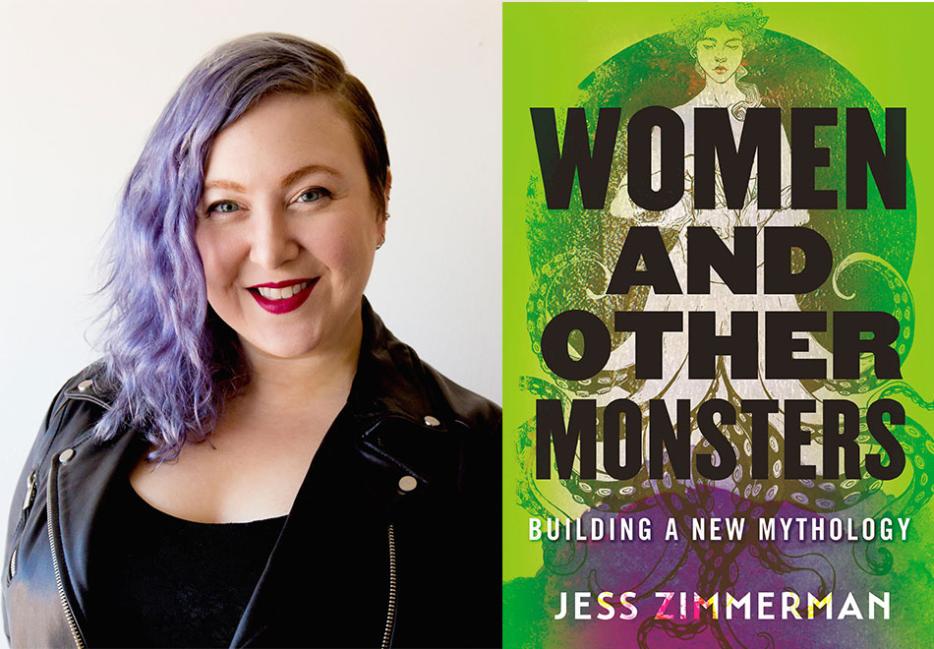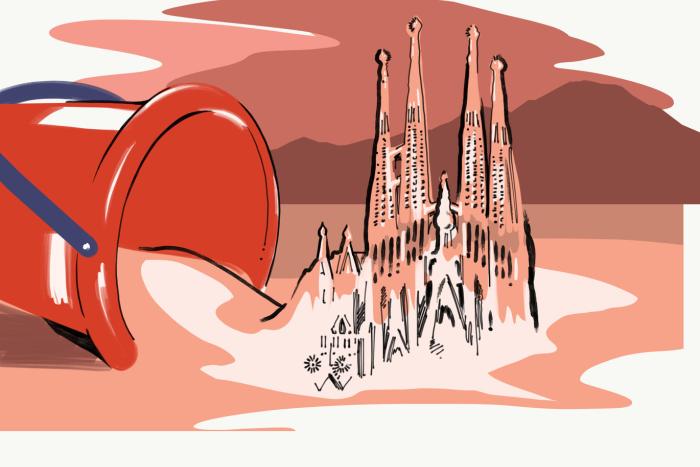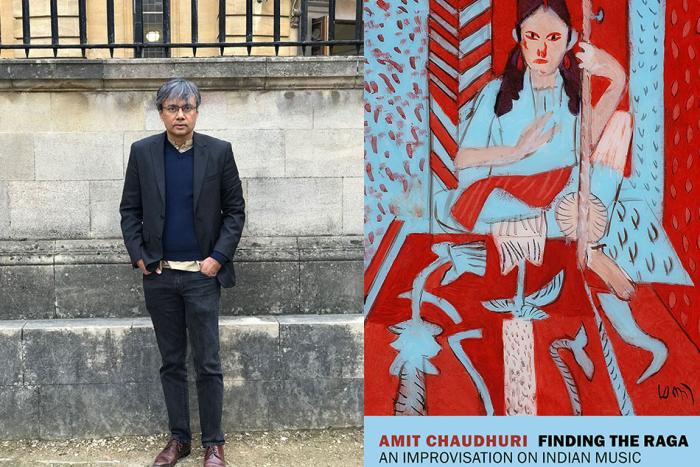In the introduction of her new essay collection Women and Other Monsters (Beacon Press), Jess Zimmerman quotes a tweet that I find embarrassingly relatable: “ok horse girls definitely had an energy but lets talk about the real powerhouses of middle school weird girls: the ancient mythology stans.”
I was a teenage ancient Greek mythology stan. In high school, I could rattle off the names of Zeus’ mistresses and their children, and knew the story of Odysseus as well as the love triangles on The OC. In my senior year of high school, I was part of a four-person team that competed in Certamen, a Jeopardy-style quiz competition that covered riveting subjects such as Latin derivatives, mythology, and Roman daily life. My team wore laurels in our hair and called ourselves the Vestal Virgins, the priestesses of the Roman goddess of the hearth, Vesta, who took a 30-year vow of celibacy and protected the sacred flame in the Temple of Vesta. (Even at the time, I knew this was a deeply uncool namesake.) All of this to say, I was very excited to read Women and Other Monsters.
In her essay collection, the Brooklyn-based writer applies personal stories and sharp cultural analysis to some of Greek mythology’s greatest female monsters, like the man-eating whirlpool, Charybdis; the seductive half-bird half-woman, Sirens; and the Furies, the three goddesses of vengeance who prowled earth to torture sinners. Zimmerman unpacks the lasting influence of these myths on western culture, dissecting monster-by-monster the way they’ve shaped our views around femininity, morality, hunger, sex, and motherhood. She rehabilitates these monsters, showing how their devious and grotesque traits are actually their greatest strengths—and also qualities that would be revered in male heroes.
Although Zimmerman read the great Greek storytellers of Ovid, Homer, and Sophocles in college and post-grad, her entry point was as a pre-schooler reading the illustrated children’s book D’Aulaires’ Book of Greek Myths. But her essays will appeal to a much wider cross-section than mythology buffs. Zimmerman shows how these monsters have shaped tropes in pop culture, and expertly weaves in candid personal stories about fatness and beauty, her ex-husband, toxic old relationships, and female friendships. I don’t think I’ve ever read something that so breezily connects the Furies to Social Justice Warriors, or segues from an
I spoke with Zimmerman over the phone—we both agreed that in Zoom calls we end up thinking too much about how we look—about the evolving transformation of Medusa, making readers feel pain, and why Greek mythology is popping up in home décor trends.
Samantha Edwards: I'm excited to talk to you today because I was also a bit of a mythology stan back in the day. D’Aulaires’ Book of Greek Myths was your first entry point to Greek mythology, and, I’m wondering, what made you so captivated by this book?
Jess Zimmerman: It’s hard to answer that just because that was many decades ago at this point. I was literally in preschool when I got my copy. It still exists, but minus both covers and a bunch of pages, and it’s got my marker scribblings in it. It’s hard to get back into that mindset, but I was attracted to things that had a sort of epic, fantasy adventure quality, which is typical for little kids. You don't realize at that time who was allowed to have the epic adventures, who is waiting at home fighting off suitors or being the monster that's being hunted and defeated. I think until you get old enough to think about it, you don't realize what kind of messages are being Trojan Horsed, as it were, into those stories. You just get caught up in the adventure aspect of it.
I got into Greek mythology later on in high school when I was taking Latin and classical civilization history classes, which I know sounds like I went to a really fancy private school. In reality, I grew up in a small town in Ontario and my high school was in the boonies. We just happened to have one teacher who was really into Latin, so I think they just let her teach these courses.
I also took Latin in high school, and I went to a public school, and I think it was just because my teacher was like 100 years old and had just been there since Latin was a normal thing to teach in high school and they couldn't make him leave.
Ok great, so we’re in the same boat where we went to public schools that for some reason had Latin.
And it’s always pushed by some weirdo who just, like, can't be made to not have a Latin class.
Our Latin teacher would actually send us older students to the Grade 9 classes when they were picking their courses for the next year and get us to try to recruit kids to sign up for Latin because the school needed enough students to justify a class.
The Latin Agenda.
Yes, totally! While studying Greek mythology, I never really thought about the monsters in the stories. I was always focused on the gods and goddesses. Why did you decide to focus on monsters, and why did you want to bring new cultural analysis to these stories? Was this a concept that you had been thinking about for a while?
Before it was a book, I did some short versions of several of these essays on Catapult. I tried to sell it as a book and people weren't interested. So, I was like, “OK, well, maybe it's an essay series.” Then an agent reached out to me, and I was like, “See! One person agrees that this is a book.” Before I started writing the book proper, I had been thinking about these extended metaphors for a couple of years, and during that time, actually, is when Circe came out. There were a few other things too, like the Medusa with the Head of Perseus statue, that were going around during #MeToo. There were a few little things that made me think that we were ready to go back to these stories and think about what we had learned from them.
Why do you think that people are more interested in these old stories now? You mentioned Circe by Madeline Miller coming out, which is super popular, but I’m also seeing mythology pop up in other ways too, whether it's a line drawing of Aphrodite on a throw pillow or, like, Greek column plant stands. Why do you think people seem to be more interested in Greek mythology?
I think it's two related phenomena, one of which is that these stories have an extreme hold over Western culture, and Western culture has been like a wild cultural juggernaut that has just been steamrolling everybody else's culture for a very long time. So, part of it is just as simple as that: this is the culture that has declared itself to be the best and the most important and has at times violently enforced that. And so, of course, these are stories that we know and that still exist in our literature and our art, because it replicates itself like a little virus. Once those images are in the arts, then that becomes what art looks like.
And then part of it is that we're continuing [to] roll back that over-influence of Western culture [to] try to make space for other ideas. We’re ready to analyze and question it, and find some other way to tell stories in a way that we haven't always been [doing]. I think that the reason those images persist and the reason that people are now interested in questioning these stories are basically the same reason, which is that it has been just this massive cultural boot on everyone's face.
I think most people have a clear idea of what Medusa looks like, but for those reading this interview who aren’t mythology stans, can you give us the CliffsNotes version of her backstory—or rather the D’Aulaires’ Notes version—and how that story has progressed and been warped by pop culture?
So, the backstory that's in Ovid’s Metamorphoses is that she used to be very, very beautiful, and, in particular, she had very beautiful hair. She caught the eye of Poseidon, who was the God of the sea. Throughout all the stories in Metamorphoses, it is never a good idea if you're a woman—or if you're coded female or feminine—to catch the eye of a God, because that almost invariably means that you're going to be assaulted. That's what happens in this story. He catches up with her in the Temple of Athena and rapes her. Athena takes that personally, because it's her temple, and takes it out on Medusa. Essentially, Medusa can turn you to stone if she looks at you, she has snakes for hair, and she has a hideous visage. All of is this is revenge that Athena takes on her for essentially being victimized in her temple. I really liked Athena when I was a kid, but she is not a sympathetic character in a lot of these stories.
What's interesting about the way that Medusa’s image has shifted, is that culturally she has sort of snuck back into being very beautiful. The book opens with this little but perfect exhibit at The Metropolitan Museum of Art a few years ago, which was about Medusa and all these other female monsters, specifically focusing on the ways that these more monstrous forms have had their edges sanded off and become more and more approachable and more and more beautiful. What that does is give the impression that any woman could be a secret monster, because they all look normal until you see the one thing. In the very ancient images of Medusa, she's got tusks, she's got a beard, she's intended to have a very frightening visage, and people would put this image outside of their homes for protection. Over time she's become the image that I think we often think of, which is where she has a very beautiful, very feminine, and often white face—and also happens to have very beautiful snake hair.
Another monster you write about is Scylla, a nymph who is turned into a sea monster by a jealous Circe. After she walks into a pond that Circe has cursed, her lower half turns into rabid dogs. The story of Scylla reminded me of the genre of body horror. During the pandemic, I watched the David Cronenberg film The Brood for the first time. Have you seen it?
I've not seen that one. But I've seen a lot of other Cronenberg movies.
So, in the movie, a woman transforms in these really grotesque ways after she undergoes a controversial therapy that makes you expel suppressed emotions through physiological changes. Apparently, the book was inspired by Cronenberg’s divorce, which makes you think like, wow, that must have been a very bad divorce.
I wonder if Cronenberg is missing the trick there. Like, obviously, I am fairly unfazed by a lot of weird body stuff. I do like going to anatomical museums. I have a lot of animal skulls and some human teeth [laughs]. I have a deep creepy streak. What tips it over to horror for me is when you really think about the fact that it’s something that could exist within your personal body. The idea of othering the horrible things that are happening really makes it toothless. Not to say I’m unaffected by Cronenberg, but I would be more affected by a movie that specifically uses the uterus or things that I know I have. That’s part of why I look at that and say, “Oh, this guy's working through some shit,” because when somebody is creating horror that is specifically about someone else’s anatomy, that's not horror. That’s a kind of violence you're inflicting on someone else.
Right, like how the story of Scylla is so scary because when she tries to flee from the dogs, she realizes they’re a part of her body and there's no escape.
That’s a chilling moment to me. And it's something that I think all of us feel occasionally about our body. That’s where the true body horror comes from. It is a part of you. The story with Scylla is that she walks into enchanted water, and then she looks down and she sees, essentially, her lower half has turned into dogs. In the image we use on the book cover, she also has tentacles, because in Homer she has these horrible, dangling legs, and very long necks. But Ovid describes her standing on dogs gone mad. That makes the hair of my neck go up.
I think that's probably why they say don’t look in a mirror if you’re on mushrooms or hallucinogens.
Yeah, absolutely.
You write pretty candidly about your body and relationships with exes. How do you approach writing about things that have caused you pain or trauma?
At this point, I’ve been writing about body stuff for long enough that it lives in an intellectual space in my brain. We already have such a visceral attachment to the body, so being able to elevate that is actually pretty useful. And in terms of writing about relationships, I still have the instincts to intellectualize, but it doesn't necessarily serve the piece to stand outside the relationship and try to analyze it in a way where you don’t actually feel it again. And so that’s more of a struggle.
There's one chapter in the book that I wrote the best I could—and then I read Carmen Maria Machado’s memoir In the Dream House. She is a real master of bringing her feelings into your body. You really experience them. That book is upsetting. It is nauseating. It is so beautiful. It's also very, very intellectual. It elevates everything. I think it's partly because she's a wonderful fiction writer, so she creates these scenes that you can really see. She's a very precise observer. So, I read that and I went back to this chapter and I was like, “This has to hurt more.” This has to suck more for me, so it can suck a little bit more for the reader in a way that feels real. I don't have her memory for details, so I ended up having to go back to like, my LiveJournal and old emails, and literally quote things that show what I was going through because I was searching for something that would convey that experience in a way that wasn't purely cerebral.
Is the chapter you’re referring to the one with the professor? Because in that essay, I really felt it. I really felt your pain. And it made me think a lot about past relationships, and honestly, it was painful! So, good job?
[Laughs] I credit Carmen for that. She doesn't know she did it, but I do credit her.
Going back and re-reading LiveJournals, diaries, and old emails can be such a nauseating experience, especially if you’ve ever been in relationships where there’s been huge power imbalances. But it also brings about this weird secondhand embarrassment too.
Oh, totally. It's mortifying. But I do try to replace the embarrassment with compassion for myself.






